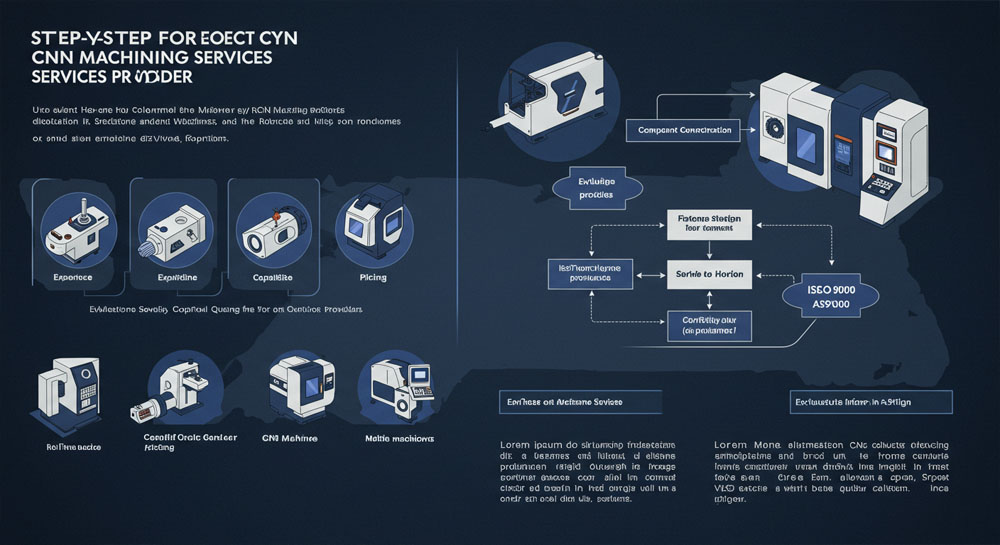how to choose CNC machining services provider
Choosing the right CNC machining services provider can make or break your manufacturing project. From the precision of your prototypes to the efficiency of large-scale production, the quality of your supplier directly impacts your timeline, budget, and final product performance.

Whether you are in aerospace, automotive, medical devices, electronics, or consumer products, this guide will walk you through how to choose the best CNC machining company for your needs.
1. Understand Your CNC Machining Requirements
Before you start looking for a provider, define your project scope:
- Part Type and Complexity
Do you need simple brackets or complex multi-axis components? Different providers specialize in different levels of complexity. - Material Requirements
Aluminum, stainless steel, titanium, brass, ABS, PEEK—ensure your provider can handle your chosen material. - Production Volume
Is it a one-off prototype, small-batch production, or high-volume manufacturing? - Tolerances and Precision
Some industries, such as aerospace and medical, require extremely tight tolerances (±0.005 mm or better). - Lead Time
How soon do you need the parts? Rapid prototyping providers can deliver in days.
2. Check the Provider’s CNC Capabilities
A reliable CNC machining partner should have the technical capabilities to meet your needs:
- Machine Types
- 3-Axis CNC Milling – Suitable for most standard parts.
- 5-Axis CNC Milling – For complex shapes and multi-surface machining.
- CNC Turning (Lathes) – For cylindrical parts like shafts and bushings.
- Swiss Machining – For small, high-precision components.
- Material Processing
Ability to work with metals, plastics, composites, and exotic materials. - Secondary Operations
Finishing (anodizing, powder coating, polishing), assembly, and quality testing.
3. Verify Quality Control Standards
Quality assurance is crucial in CNC machining. Look for:
- ISO Certification – ISO 9001 or ISO 13485 (medical) certification is a strong sign of a quality-driven organization.
- Inspection Equipment – Coordinate Measuring Machine (CMM), optical comparators, surface roughness testers.
- Process Documentation – Traceability for every batch.
- Sample Policy – Ability to produce test parts before full production.
4. Evaluate Experience and Industry Expertise
The best CNC machining providers have proven experience in your specific industry. For example:
- Automotive – Engine components, gear systems.
- Aerospace – Lightweight, high-strength parts.
- Medical – Surgical instruments, orthopedic devices.
- Electronics – Heat sinks, precision housings.
Ask for:
- Case studies from similar projects.
- References from past clients.
- Portfolio of completed work.
5. Consider Location and Logistics
While many CNC machining companies offer global shipping, location still matters:
- Local Providers – Faster delivery, easier communication, lower shipping costs.
- Overseas Providers – Potential cost savings, but consider lead times, import taxes, and language barriers.
- Hybrid Approach – Local rapid prototyping + overseas mass production.
6. Compare Pricing and Value
Choosing the cheapest option can be risky—focus on value, not just cost:
- Transparent Quotes – All costs, including setup, materials, finishing, and shipping.
- Bulk Discounts – For high-volume orders.
- Cost-Saving Suggestions – Providers who recommend design optimizations to lower costs.
7. Evaluate Communication and Customer Support
A good CNC machining partner will:
- Assign a dedicated project manager.
- Respond quickly to inquiries.
- Provide regular project updates.
- Offer technical support before and after production.
8. Check Lead Times and Capacity
- Rapid Prototyping – 1–3 days turnaround for simple parts.
- Production Runs – Varies by quantity and complexity.
- Backup Capacity – Ability to scale up production in urgent cases.
9. Review Their Technology Stack
Modern CNC providers invest in:
- CAD/CAM Integration – Faster programming and higher accuracy.
- Automation – Robotic loading/unloading for 24/7 production.
- Real-Time Monitoring – Tracking production efficiency and quality.
10. Look for Long-Term Partnership Potential
If you plan to work on multiple projects, choose a CNC machining company that can grow with you:
- Can they handle increasing production volumes?
- Do they offer additional manufacturing services (injection molding, sheet metal fabrication)?
- Are they financially stable and well-established?
Checklist for Choosing a CNC Machining Provider
Must-Haves:
- Proven industry experience
- Advanced CNC capabilities
- Strict quality control
- Transparent pricing
- Reliable lead times
- Good communication
Nice-to-Haves:
- Global shipping options
- Design optimization support
- Value-added services (finishing, assembly)
Questions to Ask Your CNC Machining Provider
- What industries do you specialize in?
- Can you meet my required tolerances?
- What materials can you process?
- How do you handle quality inspections?
- What’s your average lead time for my part type?
- Can you provide design feedback before production?
Conclusion – Choosing the Right CNC Machining Partner
Selecting the right CNC machining services provider is not just about getting parts made—it’s about finding a partner who can deliver precision, reliability, and efficiency on every project.
By evaluating technical capabilities, quality control, experience, pricing, and communication, you can find a supplier who will help you reduce costs, improve product quality, and shorten time-to-market.

